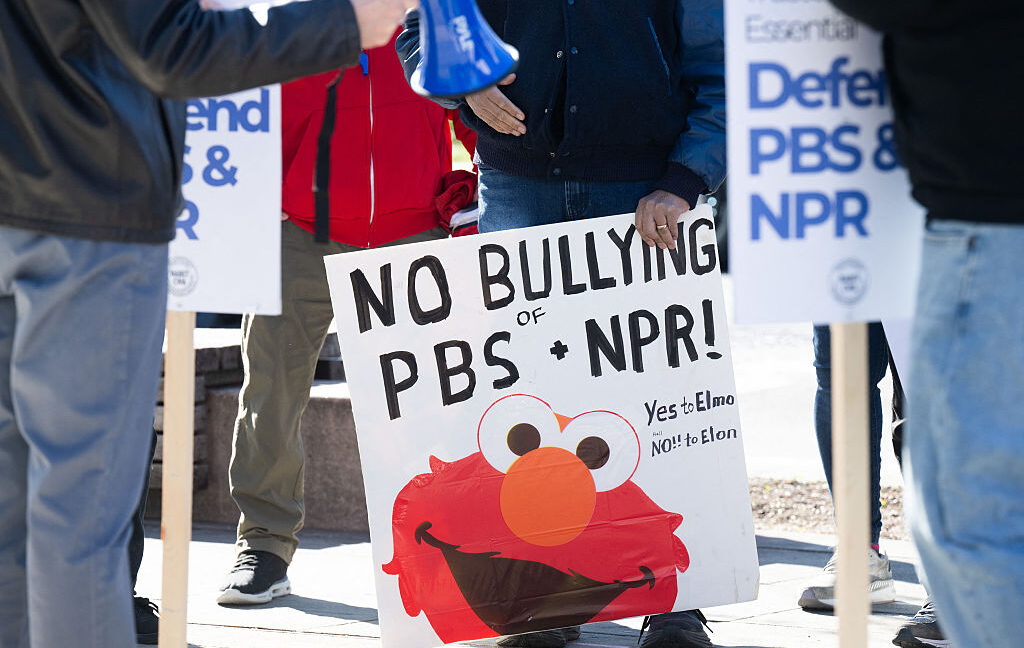Threat to "viewers like you"
“Blatantly unlawful”: Trump slammed for trying to defund PBS, NPR
Defunding PBS and NPR risks devastating rural communities, networks say.
Ashley Belanger
–
May 2, 2025 12:05 pm
|
63
People participate in a rally to call on Congress to protect funding for US public broadcasters, Public Broadcasting Service (PBS) and National Public Radio (NPR), outside the NPR headquarters in Washington, DC, on March 26, 2025.
Credit:
SAUL LOEB / Contributor | AFP
People participate in a rally to call on Congress to protect funding for US public broadcasters, Public Broadcasting Service (PBS) and National Public Radio (NPR), outside the NPR headquarters in Washington, DC, on March 26, 2025.
Credit:
SAUL LOEB / Contributor | AFP
Text
settings
Story text
Size
Small
Standard
Large
Width
*
Standard
Wide
Links
Standard
Orange
* Subscribers only
Learn more
Minimize to nav
President Donald Trump escalated his attack on NPR and PBS on Thursday when he signed an executive order demanding the end of all federal funding supporting the news outlets.
In his order, Trump claimed that unlike in the 1960s, when the Corporation for Public Broadcasting (CPB) was funded to ensure Americans had access to critical news, there are plenty of news options today. He has joined other Republicans accusing NPR and PBS of promoting a left-leaning bias. In a White House statement, he ordered any agency directly or indirectly funding the outlets' allegedly "woke propaganda" to "end the madness" as soon as possible, cutting off current funding "to the maximum extent allowed by law" and declining "to provide future funding."
Trump's authority to cut off CPB's funding continues to be disputed. In March, his administration reportedly planned to direct Congress to rescind CPB funding—as both NPR and PBS are fully funded through 2027—but according to PBS, budget director Russell Vought has yet to send over any guidance.
With that effort seemingly stalled, Trump appears to now be seeking a route around Congress. He has demanded that CPB rewrite the rules on grant eligibility by June 30 to directly ban any future funding for either NPR or PBS. That planned ban would also stop any organization that receives federal grants from sharing funding with either organization.
According to NPR, Congress allocated $535 million to CPB for 2025, and its budget is approved in a two-year cycle specifically "to insulate it from political pressures" as administrations and power dynamics shift on Capitol Hill. Currently, NPR "receives about 1 percent of its funding directly from the federal government," while its 246 member institutions "receive on average 8 to 10 percent of their funds from CPB." Partly because television programming costs more, PBS and its stations "receive about 15 percent of their revenues" from CPB, the report said.
CPB President Patricia Harrison suggested in a statement provided to Ars that these moves to block networks' funding exceed Trump's authority.
"CPB is not a federal executive agency subject to the president’s authority," Harrison said. "Congress directly authorized and funded CPB to be a private nonprofit corporation wholly independent of the federal government," statutorily forbidding "any department, agency, officer, or employee of the United States to exercise any direction, supervision, or control over educational television or radio broadcasting, or over [CPB] or any of its grantees or contractors."
In a statement explaining why "this is not about the federal budget" and promising to "vigorously defend our right to provide essential news, information and life-saving services to the American public," NPR President and CEO Katherine Maher called the order an "affront to the First Amendment."
PBS President and CEO Paula Kerger went further, calling the order "blatantly unlawful" in a statement provided to Ars.
"Issued in the middle of the night," Trump's order "threatens our ability to serve the American public with educational programming, as we have for the past 50-plus years," Kerger said. "We are currently exploring all options to allow PBS to continue to serve our member stations and all Americans.”
Rural communities need public media, orgs say
While Trump opposes NPR and PBS for promoting content that he disagrees with—criticizing segments on white privilege, gender identity, reparations, "fat phobia," and abortion—the networks have defended their programming as unbiased and falling in line with Federal Communications Commission guidelines. Further, NPR reported that the networks' "locally grounded content" currently reaches "more than 99 percent of the population at no cost," providing not just educational fare and entertainment but also critical updates tied to local emergency and disaster response systems.
Cutting off funding, Kreger said last month, would have a "devastating impact" on rural communities, especially in parts of the country where NPR and PBS still serve as "the only source of news and emergency broadcasts," NPR reported.
For example, Ed Ulman, CEO of Alaska Public Media, testified to Congress last month that his stations "provide potentially life-saving warnings and alerts that are crucial for Alaskans who face threats ranging from extreme weather to earthquakes, landslides, and even volcanoes." Some of the smallest rural stations sometimes rely on CPB for about 50 percent of their funding, NPR reported.
"Nationwide, our public television interconnection system supports the PBS Warning, Alert, Response Network, a critical pathway for the distribution of wireless energy emergency alerts to cell phones," Ulman told lawmakers.
Additionally, NPR noted that local stations "provide context that national reporters can't always get," aiding NPR's coverage of breaking national news.
It's clear that some members of the public are also alarmed by the threat to local media. Trump's March attempt to rescind funding sparked protests, heightening scrutiny of the president at a time when he also faces public backlash over tariffs and Elon Musk's Department of Government Efficiency.
Courts could possibly intervene to block the executive order. PBS reported that lawsuits opposing Trump's efforts to dismantle the US Agency for Global Media—including Voice of America and Radio Free Europe/Radio Liberty, which serve parts of the world where free press access is restricted—have won rulings that "the Trump administration may have overstepped its authority in holding back funds appropriated to the outlets by Congress."
The CPB has already sued the Trump administration, requesting a temporary restraining order to block allegedly illegal terminations of CPB board members. They're hoping a court will ultimately agree that Trump must be stopped from any efforts to "interfere with or control the governance and operations of the CPB."
So far, the pushback has not stopped Trump from continuing his attacks on public institutions, which PBS noted go beyond the CPB and include efforts to "cut off hundreds of millions of dollars in funding to artists, libraries, museums, theaters, and others," as well as efforts "to withhold federal research and education funds from universities." Together, this paints a picture of shrinking access to resources, PBS warned, which NPR suggested could result in long-lasting harms to American communities everywhere.
"Eliminating funding for the Corporation for Public Broadcasting would have a devastating impact on American communities across the nation that rely on public radio for trusted local and national news, culture, lifesaving emergency alerts, and public safety information," an NPR spokesperson warned last month.
Ashley Belanger
Senior Policy Reporter
Ashley Belanger
Senior Policy Reporter
Ashley is a senior policy reporter for Ars Technica, dedicated to tracking social impacts of emerging policies and new technologies. She is a Chicago-based journalist with 20 years of experience.
63 Comments










